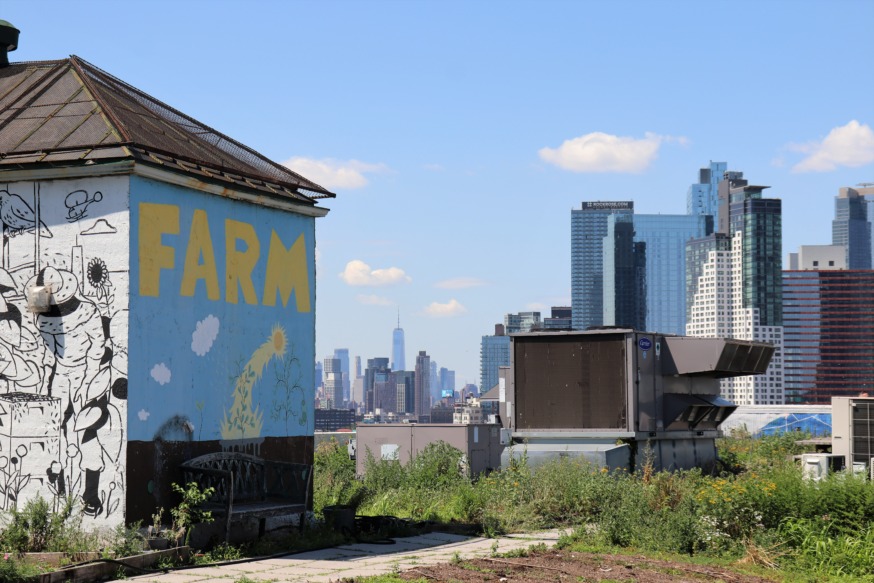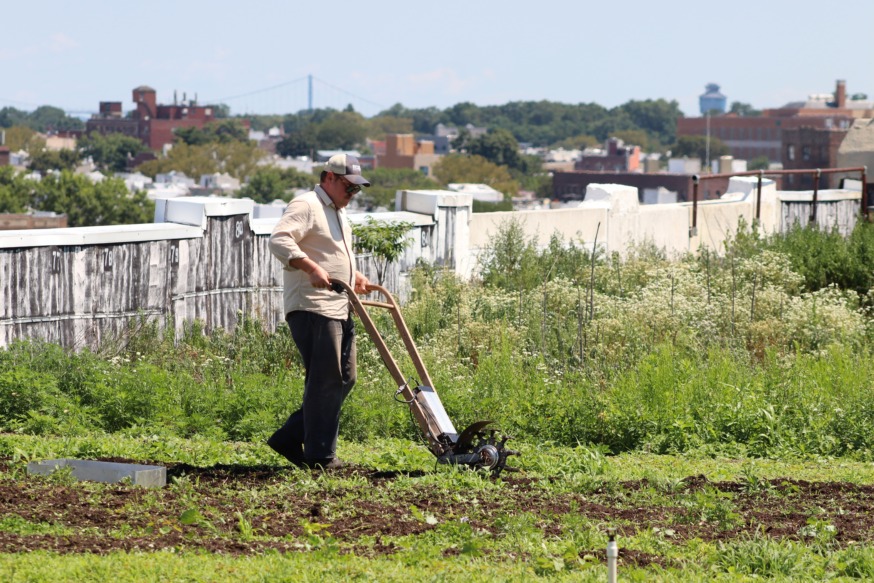
LaGuardia Community College launched a paid internship for next-gen food and agriculture professionals at Sky Farm LIC, formerly known as the Brooklyn Grange rooftop farm. (Photo by Michael Dorgan)
Aug. 14, 2023 By Bill Parry
LaGuardia Community College is going all in on its new urban farming and management curriculum and an evolving alliance with the U.S. Department of Agriculture (USDA) at the school’s Long Island City campus.
LaGuardia launched Project SEMBRAR, an experimental learning program with a three-week paid urban agriculture internship where students visited and volunteered at the old Brooklyn Grange rooftop farm in Long Island City, which was recently acquired by Variety Boys and Girls Club of Queens in Astoria, the Queens County Farm and Museum and other urban farms in Brooklyn.
The students learned firsthand about about different types of farming techniques such as aquaponics, hydroponics, rooftop farming and land-based regenerative agriculture and at Connected Chef in Hunters Point they packed more than 150 boxes of food for the western Queens community and learned about food access, food justice and food sovereignty from the founders, according to Dr. Preethi Radhakrishnan, program director of LaGuardia’s Environmental Science Program.

Brooklyn Grange was recently acquired by Variety Boys and Girls Club of Queens in Astoria. (Photo by Michael Dorgan)
“The discussions we had with the farmers at each location were rich and filled with conversations around what the future of farming looks like in urban landscapes through the lens of climate resiliency,” Dr. Radhakrishnan said. “Student reflections revealed that agentic and service-based learning are powerful ways to engage students with course content that is deeply meaningful. It was wonderful to see students engage in conversations with farmers and soil scientists about how soils are depleted by monocropping, about the differences in engineering that goes into rooftop agricultural spaces and about how food, agriculture and health care are intimately related.”
The third week of the program took the interns to SUNY Cobleskill where they learned more about the future of the agricultural workforce.
“During this week-long venture at SUNY Cobleskill’s 902-acre campus, students learned about dairy processing, which included milking cows,” said Dr. Radhakrishnan. “We also participated in many hands-on modules focused on precision agriculture, wildlife and fisheries science, small animal industry and fermentation science. Students were able to interact with professors at the four-year school, from Environmental and Energy Technology, Plant Sciences, Fisheries & Wildlife and Animal Sciences.”
She launched Project SEMBRAR two years ago with the main goal to sustain and grow the next generation of urban STEM agricultural leaders noting that LaGuardia has seen the fastest growth in STEM graduates, increasing an astonishing 76% since 2015-2016. Sembrar is Spanish for “to plant” and her program builds a pathway to degrees and careers in urban agriculture and food science for Hispanic and low-income students of color, anchored by robust high-tech career development opportunities, outreach and curriculum.

The three-week internship took the LaGuardia students to SUNY Cobleskill to see the impact their education could have on the lives of their community and planet. (Courtesy of LGACC)
“This project will do this by building and strengthening strategic partnerships between high school, associates, bachelor’s programs and local community stakeholders; creating opportunities and access to food and agricultural careers in the public and private sector; and strengthening recruitment, retention and leadership at LaGuardia and our four-year CUNY partner institutions,” Dr. Radhakrishnan said. “For me, witnessing the close partnerships that students made within these three weeks forming their ‘educational family’ seeing students engage with farmers and educators outside LaGuardia was incredible.I would love to see this program continue in the future with perhaps more programming on our own LaGuardia Urban Farm on day.”
The experimental learning program was recently bolstered by a $250,000 USDA funded Hispanic-Serving Institution (HSI) grant and on Aug. 7, LaGuardia welcomed Herminia “Mina” Gomez as the USDA HSI Liaison to serve as the primary contact and work with other HSIs in the Northeast region on enhancing their programs and opportunities for students.

LaGuardia welcomed Herminia “Mina” Gomez as its new liaison to the USDA working with other Hispanic-Serving Institutions in the Northeast region. (Courtesy LGACC)
“These efforts are part of USDA’s commitment to advance equity in professional development opportunities as well as build a more diverse pipeline into public service and the agricultural sector,” Gomez said. “LaGuardia faculty and staff are passionate about their students, and in shaping them into the leaders of tomorrow. I know LaGuardia students are resilient, often first-generation students that bring with them a wealth of knowledge. I want to present all of them with an opportunity to be part of the USDA family to make a difference and impact in the lives of people across the United States.”
As a USDA liaison, Gomez will support students, faculty, and staff from historically underserved communities with access to information and guidance on applying to internships, educational opportunities and services that exist within USDA.
“Welcoming Mina to the LaGuardia campus will create opportunities for our students, faculty and staff to learn about the USDA and to carry out our mission of serving our community to meet their needs,” LaGuardia Community College President Kenneth Adams said. “We are in a better position to enhance our support and to collaborate with the USDA.”
One Comment

I took agriculture lessons in theory and practic, since then I can’t conceive living with out sowing seeds, even when making salads a separate the seeds of the best possible. I develo a deep connection and understanding. The first time I plant in America got suchiny bigger than my arms and sunflowers, juicy steak tomatoes. I do encourage the incorporation of those studies to engrave respect, appreciate and love for the resources and in taking advantages in this type of opportunities. Is a very positive news.